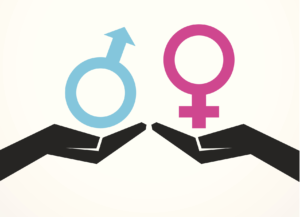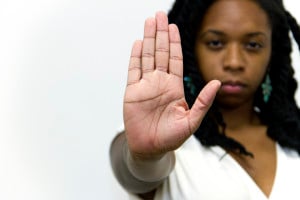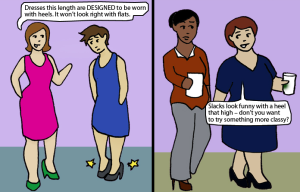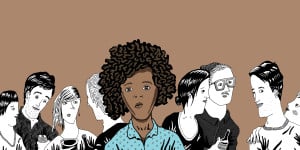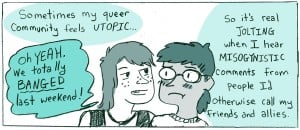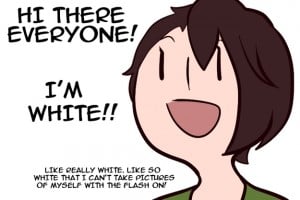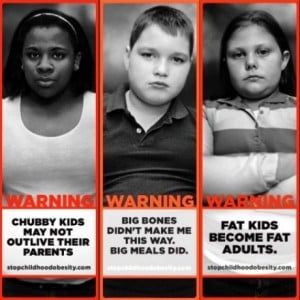
Source: Anthropology in Practice
Yes, we all know the ways that secretly racist white people are not at all actual racists – or at least not intentionally:
“ I have _________ friends!”
“I work with _________ people!”
“I do anti-racist work!”
“I have helped bring diversity to the company I work for!”
“I don’t hate _________ people!”
Let’s be clear: These are all statements that people of color have heard over and over again when we try to talk to non-racist white people about their racism, only to get accused of “playing the race card” or “being a reverse racist” or forgetting that we “finally live in a post-racial society (I mean, it’s not like we’re in the 1950s any more, at least).”
Well, it’s definitely not 1950, and we definitely do not live in some mythical post-racial society where we have moved beyond race and are simply human (please put on your rose-tinted glasses right now if that last statement seemed even slightly ludicrous to you).
We do, however, live in a society where White Supremacy is alive and thriving very well.
But I get it. When you are in a place of privilege, it is easy to not recognize the ways you participate in and benefit from racism.
Here are some reasons why even the most “well-intended” white person can consciously and unconsciously still participate in racism:
1. You Are Afraid of People of Color
Behind all of the nice smiles and kind gestures, you have subtle, yet constant, fears for your safety around people of color.
This can manifest as you slightly hold your personal belongings close to your body when those Black and Brown men come around, the nervous hair twirling while attending an event with your only POC friend in a “bad area,” or the wide-eyed looks when your fellow classmate or colleague is venting on their frustrations with racism.
All of these (quite often) involuntary forms of body language represent the deep fear that you may call “unfamiliarity.”
But by dismissing your fear of POC and calling it unfamiliarity, you are actually disregarding the way that society has socialized us all (even POC, ourselves) to fear POC – which, actually, has a very dangerous consequence.
For example, consider how local media sensationalizes “black on black crimes,” white people being robbed or murdered by black men, and black women being incarcerated for neglect, prostitution, and “random acts of violence.”
This type of reporting influences the ways you view Black communities – which, in turn, influences what laws you vote for (that target black communities) and what atrocities you attempt to validate (“…but he was a thug. There were pictures of him on Facebook throwing up gang signs”).
#BlackLivesMatter was started by three black women after the murder of Trayvon Martin by George Zimmerman. The intervention became even more widely spread after the killings of Mike Brown, Eric Garner, and Tamir Rice .
Black men aren’t the only ones being killed by the cops. Black girls and women also being targeted, including black trans women, including Alyana Jones, Tarika Wilson, Nizah Morris, and Rekia Boyd.
These murders truly speak to how much our society fears black people (and other darker skinned people of color).
So what do you do when your friend, classmate, or colleague brings this up to you? Do you nod in silence? Do you contest the assertions of the person you are talking to by asking if they’ve thought about the safety of the cop(s) who murdered these individuals?
Do you think about how this societal fear of black people is rooted in white supremacy and how it is detrimental to communities of color?
Nodding in silence doesn’t convey compassion; it conveys a fear of actual engagement. Further, it’s a disregard for your friend’s feelings and the life that was stolen.
Instead, we need your vulnerability. Put yourself out there and figure out how you can best help us make a change.
Contesting any assertion of racism made by a person of color is racist.
There are countless examples of white people using and selling illegal narcotics, committing murder, openly carrying guns, terrorizing various communities, and either having the right to trial or getting away free.
And while, you, as a “well-intended” white person may merely agree that white people are able to get away with these crimes, your privilege allows you to acknowledge oppression without taking accountability for how you benefit from these injustices.
Why can’t communities of color be given this right?
We are not given this right because your fear is seen as valid and the actions that come from that fear are seen as necessary.
When #BlackLivesMatter is deflated into #AllLivesMatter, it erases the experiences of black people and the violence that police surveillance represents.
These inherent fears of people of color represent not just the assumed inherent violence of people of color, but also the perceived innocence and safety of whiteness.
2. You Disregard the International Violence and Atrocities Happening to POC Globally
Saying that you don’t hate POC is keeping your anti-racism at surface level. When thinking of how far racism goes, we must think globally.
Racism doesn’t just exist in America; it is everywhere.
However, it manifests itself imperialism, global capitalism, colonialism. When thinking of how #BlackLivesMatter, we must remember how far and wide that goes. Black American lives matter, and the lives of people of color everywhere matter as well.
Only advocating for the lives of POC with whom you interact daily, while ignoring the lives of POC whom you don’t see, is an act of racism.
As you move forward in thinking about ways to dismantle racism and white supremacy, you must make efforts to learn about what is happening in communities of color locally, regionally, nationally, and internationally.
It is no coincidence that individuals were quick to be in solidarity for those killed in the attack on Charlie Hebdo, but were silent when a ten-year-old detonated explosives in a crowded market of Maiduguri.
It is no coincidence that there are individuals who still do not know about the mass killings in Baga, but know everything about “black on black crime.”
Anti-racism should be borderless. Saying that you march in solidarity with communities of color in the United States, but don’t know how to globalize that solidarity is completely dismissive.
Communities of color within the States are consistently bombarded with derailing statements such as:
“This is not just local; this is global.”
“We need to focus on the big picture, not necessarily what’s happening here.”
“If we look big first, then we will be able to see that our problems here aren’t as bad.”
When will you – as “anti-racists,” as white people who don’t hate us and claim to be in solidarity with us – stop using global acts of oppression as a derailment, but as a driving force to mobilize with communities from Ferguson to international communities in Mexico, Nigeria, and Colombia that are experiencing displacement at alarming rates?
Oppression is not a contest. It is a reality that communities of color face 24/7.
3. You Disregard the Fact That POC Are Not All the Same, Erasing the Intersecting Identities That Affect Their Lives
Race isn’t the only thing that makes up and affects the lives of people of color. There are so many other intersections and identities that we embody.
Post-racial ideologies erase those intersectional experiences. They erase the experiences that queer people of color face regarding fair housing, homelessness, employment, sexual harassment and assault, and treatment while incarcerated.
It is an act of pure violence to erase the unique experiences and identities of people of color and call it “post-racial.”
In fact, even conflating racial identities into the phrase POC, just to be politically correct, is a racist act in itself.
As an ally, it is essential that you know the history and meaning of “POC” as an identifier, and that you know when to use it (and not use it) so that you don’t erase or conglomerate our experiences.
Seeing the intersections of all our identities, including our racial identities, gives life to our experiences and allows you to be aware of how the intersections of your identity might actually parallel ours.
In this, you are not only able to see our lives as a reality, you are able to see how racism and your privilege of not having to face it directly allows you to interact with even the marginalized intersections of your identity more freely.
4. You Tokenize POC in Your Workplace
It isn’t rare for a person of color to be one of few in their place of work. And usually, those few are expected to be a voice for, or representative of, every one in their racial group. This often leads to being asked questions like:
“Have you heard about [insert current event involving some racist act here]?”
“You’re so different compared to other ________ people.”
“What can we do to make our company more diverse?”
“You’re so smart! Do you want to be the leader of this diversity campaign?”
Bombarding people of color with questions about their racial identity and/or expecting them to consistently have input on how to make your company more inclusive are just some of the microaggressions people of color face in their workplaces regularly.
5. White Silence
It has become a very common tactic among “well-intended” white people, including white people posing as “anti-racist,” to dismiss the different ways racism continues to work its way into the everyday lives of people of color. The response to this “modern-day” racism is:
“Everyone goes through these things! We’re all fighting for the same thing!”
“I’m a gay man! I experience the exact same oppression, and you don’t see me complaining.”
This type of response allows white people to excuse themselves from being accountable for both their racist actions and privileges.
Part of breaking down systems of oppression is being accountable.
When white allies are only present and vocal in spaces where they feel comfortable and able to blend in, they don’t have to worry about accountability.
If you feel comfortable being present and vocal at events for fellow anti-racists, we also need you to be present and vocal in spaces where blatant racist ideals are upheld.
As long as being present involves no accountability, being vocal is easy.
Being an ally is an action, not an identity. It’s means taking risks, giving up the safety of silence, and rejecting all unfair privileges.
***
Racism works its way into our institutions, policy-making, and mass media messages. Knowing how you play a role in letting these messages continue to be put out is important as you determine the role you will take to fight racism.
So what do you do after acknowledging your privilege? Do you wallow in self-pity? Do you hate yourself? No. Or maybe you will and that can be a part of your journey (not a distraction) to accountability.
You alone aren’t going to end racism.
There is no white anti-racist superhero that is going to save the world from White Supremacy.
However, you can make a difference by being accountable, opening yourself up to being called out, and taking that as a call to action rather than a blow to the face.
Asking how you can help when you know what work needs to be done in your direct communities shows that you can be “doing the work,” but not sustaining the work.
It’s easy to continue being present in spaces centered around social justice, but when it comes to holding the people in your daily life accountable for their racist actions, it may not come so easy.
Taking on that responsibility and not expecting answers from people of color on how to solve racism allows you to play your part.
[do_widget id=”text-101″]
Search our 3000+ articles!
Read our articles about:
Our online racial justice training
Used by hundreds of universities, non-profits, and businesses.
Click to learn more






